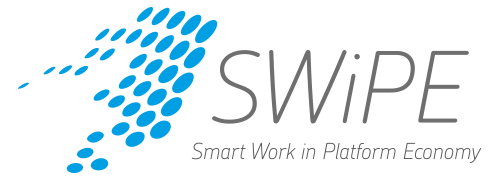Digital platforms, platform economy, crowdsourcing, uberisation… what??!! As an occupational health researcher, I’ve long studied working conditions, positive attitudes and wellbeing in different, but more or less traditional, occupations such as teaching, dental care, the fire service and the judiciary, as well as in organisations such as schools, day-care centres, factories and even parishes. The strategic research council-funded Smart Work in Platform Economy project will provide an almost incredible opportunity to study emerging working life phenomena.

Usually research looks backward in time and tries to understand what already exists and then, perhaps, make a prediction for the future based on findings. This leaves a lot of questions unasked; for example, work psychology studies rarely touch upon new forms of work and entrepreneurship. The SWiPE project allows going with the flow of events and an opportunity to grasp what is only now occurring; what the platform economy is and could become – and what it will mean to people in different sectors.
At the moment, broadly speaking, we have no clear idea how many people in Finland are working in the platform economy. If finding a clear definition of who is working in the platform economy is difficult, it is even more difficult to run these people to earth for research. For now, the platform economy has largely been analysed, and not that extensively as yet, as a social and sociological phenomenon. Identifying the people at both the centre and the periphery of the platform economy is an important challenge.
How then to understand people and work on the cusp of the platform economy? Who do we study in our projects? Uber-drivers? Admittedly that’s an illegal occupation in Finland. Couriers? Interesting to be sure; I had thought that the summer job as an “ulkostuppari” I had when I was 14 had disappeared entirely. Seems that the digital age does not just make jobs disappear, it also brings back those that seemed to have been lost. Highfliers in a changing world? For example, YouTube stars and those that create popular platforms; this also sounds important, but would they welcome this research in the first place? Those creators of apps and the other self-employed who try as they might have yet to succeed? Those workers in the public sector who have been most affected by digitalisation? All those gig workers who make use of the platform economy to either make a little extra or to provide for themselves? It is clear that if we are to understand what the platform economy means to work and workers, we’ll need to reach as many groups as possible. It is also clear that their work realities will differ markedly from one another.
Another interesting question for an occupational health researcher is what are the different work related demands and resources in the platform economy? And how might their balance be optimised so that people feel well and feel that what they do is meaningful? At the moment the most popular work psychology model, that of Work Demands – Work Resources, suggests that all occupations have particular demands which, when taken too far, cause stress and health problems. Conversely work can have energising resources that create growth, development, engagement with work and so lead towards innovativeness and productivity growth. Going furhter, how might the universal bases for wellbeing and meaningfulness – autonomy, socialisation, ability and doing good onto others – be assured in new forms of work?
The questions don’t stop there either. At the moment, most platform economy work is gig work; what are its effects on work life balance? Does this kind of work add flexibility to everyday life or does it cause new pressures and scheduling challenges because of odd working hours? And is gig work done for something other than to supplement existing income? Does anyone expect this type of work to be meaningful or that it contributes to wellbeing? Would I keep doing this if I win the lottery? Also, in practical matters, how is work organised and how do the self-employed learn to manage themselves, their work and to be proactive?
We know far too little about the effects of digitalisation and the platform economy on work. In practice we know nothing about their effects on wellbeing, the meaningfulness of work and how work is organised (top down vs. bottom up). It is nevertheless clear that irrespective of the context in which work is done the worker expects to be compensated fairly and – regardless of my earlier questions, I believe – expects to feel well and to do meaningful work. At best, even in the age of the platform economy he will be able to do things of his own free will, feel that he belongs to wider society, to make ends meet, to achieve and to live a good life.
Blog post by Jari Hakanen, a Research Professor at the Finnish Institute of Occupational Health. Read more about Jari and his work and research here.
